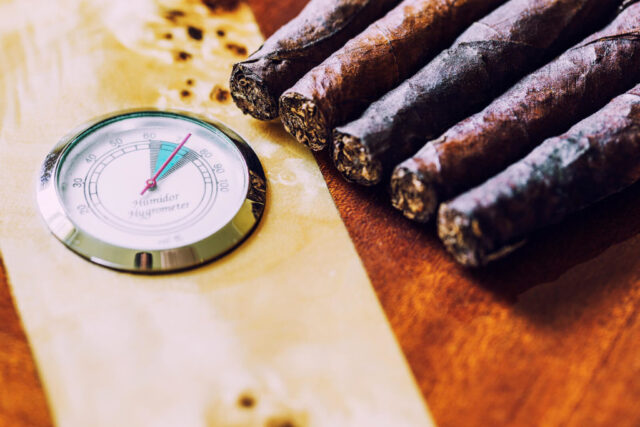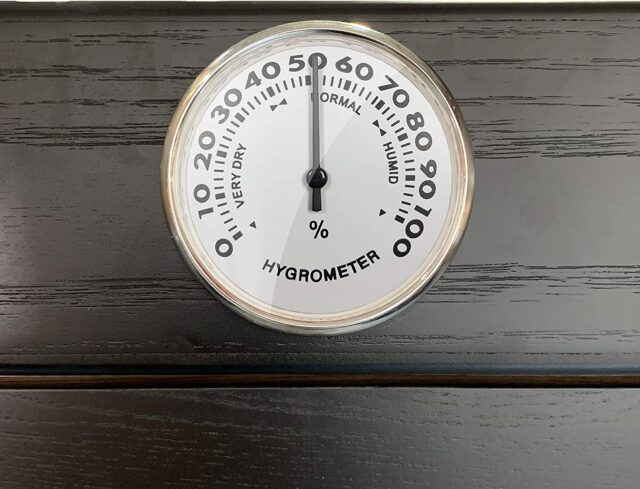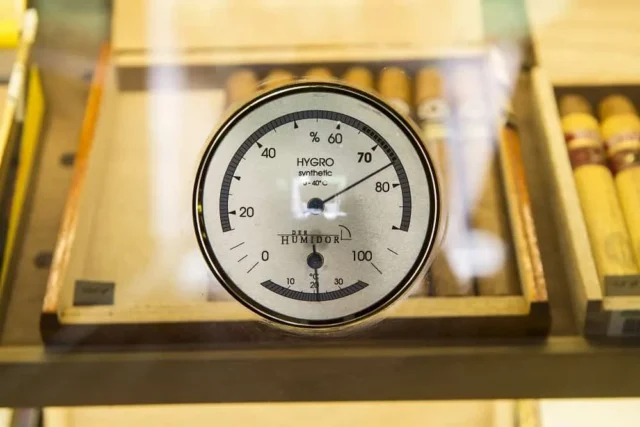
For aficionados, cigars are more than just a luxury; they’re an experience. Each cigar tells a story, from its origin to its flavor profile. However, like a fine wine, cigars require optimal storage conditions to preserve their essence. Proper cigar storage is not just about aesthetics or organization; it’s about maintaining the cigar’s integrity, ensuring that every puff delivers the intended flavor and experience. Let’s embark on a journey to understand the nuances of cigar storage and the pivotal role of hygrometers.
The Role of Humidity in Cigar Storage
Humidity plays a paramount role in cigar storage. Cigars are hygroscopic, meaning they absorb and retain moisture from their surroundings. The right humidity level ensures that cigars remain fresh, preventing them from becoming too dry or too moist. Dry cigars can burn too quickly, producing a harsh taste, while overly moist cigars can become moldy or difficult to light. Thus, maintaining the right humidity level is a delicate balancing act that can make or break the cigar experience.
What Is a Hygrometer?

Enter the cigar hygrometer, a cigar enthusiast’s best friend. A hygrometer is an instrument designed to measure the amount of humidity in the air. In the context of cigar storage, it’s an indispensable tool. With a hygrometer, you can monitor the humidity levels inside your humidor, ensuring that your cigars are stored under optimal conditions. Think of it as a guardian, constantly watching over your prized collection.
Types of Hygrometers
Hygrometers, essential tools for cigar enthusiasts, come in various shapes and sizes, each tailored to specific needs. Predominantly, there are two primary types: analog and digital hygrometers. Analog hygrometers, reminiscent of a bygone era, are often found gracing traditional humidors. They operate using a spring mechanism to gauge humidity. While they exude a classic and elegant charm, they sometimes may lack the precision modern aficionados seek.
Digital hygrometers, leveraging modern technology, utilize electronic sensors to provide pinpoint accurate humidity readings. Beyond just humidity, they often boast additional features, such as temperature readings, making them a multifunctional tool. Due to their enhanced accuracy and added features, they are generally perceived as more reliable than their analog counterparts.
Calibration of Hygrometers
In the realm of cigar storage, accuracy is not just important; it’s paramount. A slight deviation in a hygrometer’s reading can jeopardize the integrity of an entire cigar collection. This underscores the importance of calibration. Calibration is the process of fine-tuning your hygrometer to ensure it provides precise, trustworthy readings. Among various calibration methods, the salt test stands out as a popular choice.
This method involves placing the hygrometer in a sealed environment alongside a saturated salt solution. After a waiting period, typically several hours, a well-calibrated hygrometer should indicate a humidity level of 75%. If there’s a discrepancy, adjustments are necessary to ensure accuracy.
Ideal Humidity Levels for Cigars

When it comes to cigars, is there an ideal humidity sweet spot? Most experts concur that cigars thrive best in a humidity range between 65% and 72%. Operating within this spectrum ensures that cigars maintain adequate moisture, crucial for preserving their rich flavor and smooth burn. However, it’s also imperative to avoid excessive moisture, which can render cigars susceptible to mold and other issues. It’s worth noting that cigar storage isn’t a one-size-fits-all scenario. Personal preferences weigh in, and some aficionados might have a penchant for slightly drier or moister conditions, tailoring their storage environment accordingly.
The Impact of Temperature
While the emphasis on humidity is undeniable, one mustn’t overlook the role of temperature in cigar storage. The consensus among experts is that the ideal temperature hovers around 70°F (21°C). Fluctuations beyond this can have repercussions. Elevated temperatures can hasten the cigar aging process and, more worryingly, increase the risk of infestations, like the dreaded tobacco beetles. On the other end of the spectrum, colder temperatures can sap cigars of their moisture, leading to an undesired dryness. Hence, a holistic approach, monitoring both temperature and humidity, is pivotal for optimal cigar storage.
Common Mistakes in Cigar Storage
The journey of cigar storage is riddled with potential pitfalls. Novices and even seasoned aficionados can sometimes err. A prevalent mistake is the over-reliance on a humidor’s built-in hygrometer without periodically verifying its accuracy. Environmental factors, too, play a role. Placing a humidor in direct sunlight or proximate to heating sources can induce unwarranted temperature spikes. Another oversight is overfilling a humidor, which can impede proper air circulation. Additionally, resorting to incorrect or makeshift humidification methods can compromise the quality and longevity of cigars.
Hygrometer Placement
In the world of cigar storage, every detail matters, right down to where you place your hygrometer. For the most accurate and representative readings, it’s advisable to position your hygrometer centrally within your humidor, ensuring it’s distanced from the humidification device. This strategic placement ensures the hygrometer captures the overall humidity ambiance, negating potential localized fluctuations that can skew readings.
Maintenance of Hygrometers

Instruments, no matter how advanced, demand upkeep, and hygrometers are no exception. To guarantee continued accuracy, especially in digital variants, it’s essential to periodically clean the sensor. Battery-operated models require vigilant monitoring of battery levels, with timely replacements ensuring uninterrupted operation. Analog hygrometers, given their mechanical nature, benefit from periodic recalibrations, ensuring they remain on point and trustworthy.
Troubleshooting Hygrometer Issues
Hygrometer readings that seem amiss can induce panic, but it’s essential to approach such scenarios methodically. The first port of call should be to verify its calibration, ensuring it’s aligned correctly. If inconsistencies persist, consider the hygrometer’s age. Analog models, over extended periods, can exhibit wear, impacting their accuracy. In such instances, an upgrade to a contemporary digital model might be in order. Additionally, inspect the humidor’s seal, ensuring it’s airtight. Air leaks can introduce external humidity, skewing internal levels and readings.
Final Thoughts on Cigar Storage
In the world of cigars, details matter. Proper storage is the difference between a sublime experience and a lackluster one. Hygrometers, with their ability to monitor humidity, are the unsung heroes of cigar storage. By understanding their significance and ensuring their accuracy, you can unlock the true potential of your cigar collection, savoring each moment to the fullest.









